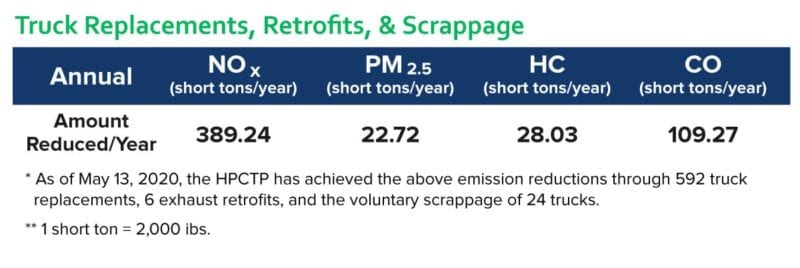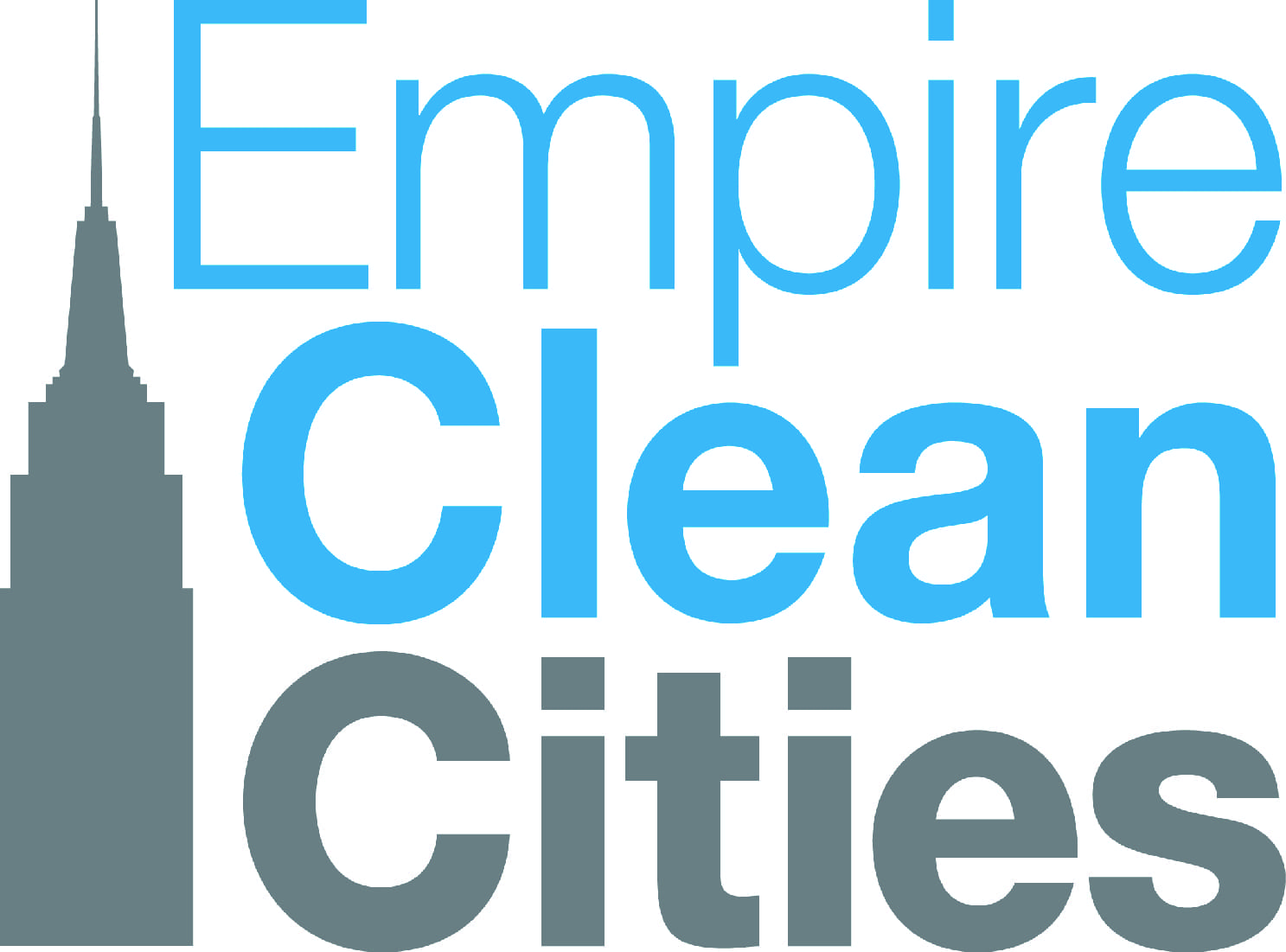The New York City Clean Trucks Program (NYC Clean Trucks Program) will administer approximately $9.8 million in Volkswagen Settlement Funds to replace older, heavy-polluting diesel-powered trucks in New York City with new, less polluting trucks. The overall goal of the program is to reduce diesel pollution from vehicles. This will help improve air quality, reduce greenhouse gas emissions that contribute to climate change, improve public health, and promote investment in cleaner, advanced trucks and transportation technologies. There are two upcoming webinars to learn more about the details of the program, on Wednesday, June 10 and Tuesday, June 23.
The NYC Clean Trucks Program will fund the replacement of older, heavy-polluting diesel-powered trucks with new, less polluting trucks to improve air quality, reduce GHG emissions, and improve public health.
The NYC Clean Trucks Program launched on June 3, making rebate incentive funding available to replace medium- and heavy-duty trucks, with an emphasis on all-electric, zero tailpipe emission trucks. Applicants may also apply for funding to purchase Environmental Protection Agency (EPA) emission compliant alternative fuel trucks (compressed natural gas, diesel-electric hybrid, and plug-in hybrid electric), or new diesel trucks. For each new vehicle funded by the Program, one older, eligible diesel truck must be relinquished, scrapped, and effectively taken off the road. Eligible vehicles for replacement are Class 4 to Class 8 diesel-powered trucks with engine model years 1992 to 2009. Through the offer of rebate incentive funding, the NYC Clean Trucks Program incentivizes local commercial fleet operators to transition away from diesel trucks.
NYC Industrial Business Zones to Benefit
To this end, the NYC Clean Trucks Program focuses its truck replacement projects on businesses that move goods and commercial truck operators located in or providing service within a half-mile of program-approved Industrial Business Zones (IBZs). These IBZs are thriving, high-performing manufacturing and industrial zones ratified by the City of New York in 2006 to protect existing manufacturing districts, foster economic development, and encourage industrial growth citywide.
However, due to the heavy manufacturing and industrial uses in IBZ areas, communities surrounding IBZs suffer disproportionate levels of vehicle and industrial emissions, causing local public health hazards and environmental issues. Also known as environmental justice (EJ) communities, these areas have historically been subject to higher levels of diesel exhaust emissions from idling diesel engines, intensive truck infrastructure, and dense highway networks. Pollutants from diesel exhaust include nitrogen oxide (NOx), fine particulate matter (PM2.5), hydrocarbons (HC), carbon monoxide (CO), and carbon dioxide (CO2). Vehicle diesel exhaust, often from medium- and heavy-duty vehicles, can lead to health problems, such as asthma, heart disease, and other cardiovascular and respiratory issues. The congestion of vehicles and clustering of transportation infrastructure in these communities contribute to high rates of hospitalization and child-born asthma.
Businesses that move goods and commercial truck operators located in or operating within 0.5 miles of program-approved IBZs throughout New York City can apply for rebate incentive funding to replace older diesel trucks.
By prioritizing truck replacement projects for businesses operating in IBZs, the NYC Clean Trucks Program aims to address this public health concern and provide a solution for reducing levels of diesel pollutants in these EJ communities. Zero emission and alternative fuel vehicles that travel within and around IBZs and EJ neighborhoods will help lessen the burden of diesel exhaust and reduce the harmful impact of these pollutants on local residents. Zero emission vehicles use on-board batteries and an electrical motor to power the vehicle and therefore produce no exhaust. Alternative fuel vehicles have proven reductions in life cycle greenhouse gas emissions.
Expanding the Success of the Hunts Point Clean Trucks Program
The NYC Clean Trucks Program builds on the success of the Hunts Point Clean Trucks Program (HPCTP), a truck replacement program administered by NYC DOT since 2012. The HPCTP focused on vehicle replacements in the Hunts Point and Port Morris neighborhoods of the Bronx. These neighborhoods are home to truck-intensive infrastructure, namely due to the Hunts Point Food Distribution Center. On a daily basis, almost 13,000 trucks travel into and out of the center. Between 2012 and 2020, the HPCTP funded a total 622 trucks, including 592 truck replacements, 6 exhaust retrofits, and the voluntary scrappage of 24 trucks. Using the U.S. EPA’s Diesel Emissions Quantifier (DEQ), the HPCTP has reduced levels of NOx, PM2.5, HC, and CO annually when compared to the emissions profile of the older, diesel-fueled vehicles.
 The NYC Clean Trucks Program was developed in partnership with the New York State Department of Environmental Conservation (NYSDEC) to reduce the cost of medium- and heavy-duty replacement trucks that are not only better for the environment, but are oftentimes more cost effective when compared to the older, existing diesel trucks currently being operated in and around New York City. The Volkswagen Settlement funding available from the NYC Clean Trucks Program will replace several hundred trucks, improve air quality, and help pave the way for zero emission freight delivery. In order to find out more about the program or how to apply, please visit the NYC Clean Trucks Program website to learn more. There are two upcoming webinars to learn more about the details of the program, on Wednesday, June 10 and Tuesday, June 23. Both webinars are at 1:00pm EDT.
The NYC Clean Trucks Program was developed in partnership with the New York State Department of Environmental Conservation (NYSDEC) to reduce the cost of medium- and heavy-duty replacement trucks that are not only better for the environment, but are oftentimes more cost effective when compared to the older, existing diesel trucks currently being operated in and around New York City. The Volkswagen Settlement funding available from the NYC Clean Trucks Program will replace several hundred trucks, improve air quality, and help pave the way for zero emission freight delivery. In order to find out more about the program or how to apply, please visit the NYC Clean Trucks Program website to learn more. There are two upcoming webinars to learn more about the details of the program, on Wednesday, June 10 and Tuesday, June 23. Both webinars are at 1:00pm EDT.


